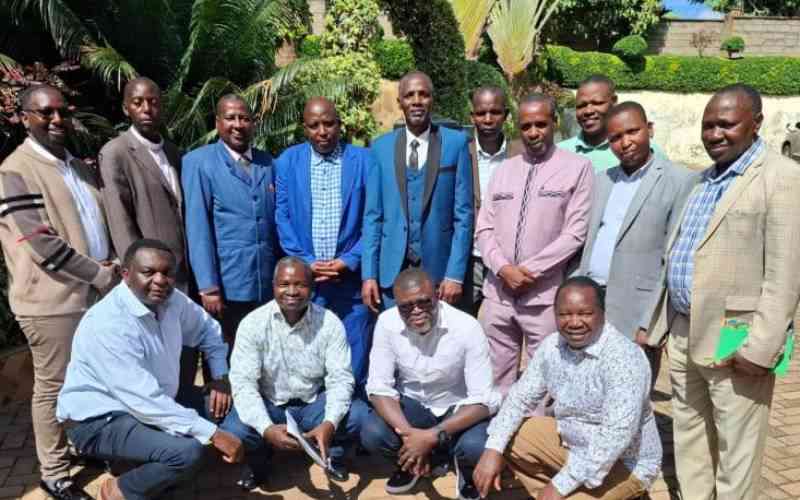
Member of Association of Pentecostal and Evangelical Clergy of Kenya with after a sensitization meeting on GMOs. [Nanjinia Wamuswa, Standard]
In the Bible, Hosea Chapter Four, verse six says, "My people are destroyed for lack of knowledge."
The clergy understands this verse underscores the importance of understanding God's will and the consequences of disregarding it.
Similarly, the Association of Pentecostal and Evangelical Clergy of Kenya (APECK) in Kiambu has come to understand the significance of awareness surrounding Genetically Modified Organisms (GMOs) in Kenya.
The clergy, like many other Kenyans, had been confused about genetically modified crops, unsure of the truth due to a lack of proper information.
However, this changed after APECK members met with scientists from the Kenya University Biotechnology Consortium (KUBICO), who thoroughly explained GMO processes and how the technology aims to improve productivity and food security in the future.
Armed with newfound knowledge, the clergy is now calling on the government to invest more in genetically modified crops and research to ensure only quality and safe crops are consumed in the country.
This follows the High Court's dismissal of all cases opposing the lifting of the ban on GMO crops and foods in Kenya.
In his ruling, Justice Lawrence Mugambi threw out the petitions challenging the lifting of the ban, stating the issues had been fairly addressed at the Environment and Land Court in Nairobi last year, as part of a suit filed by the Law Society of Kenya (LSK).
Rev. Fredrick Ngugi, National Chairman of APECK, reveals that initially, they had little information about GMOs.
"We have just learned that GMO crops are not poison, as they've been made to appear, but rather improved crops modified to resist diseases and pests and produce more," he says.
He stresses the need to embrace new scientific methods of farming and gain a deeper understanding before the rollout of GMO crops early next year.
"We hope that the government, together with experts from our universities, will work together with the same information we have received and adopt this farming method. We have been condemning GMOs without proper information," he adds.
Bishop John Chere, Chair of APECK in Githunguri Sub County, emphasises that now they are properly sensitised, it's time to stop spreading myths about the safety of GMO foods.
"After being taken through the process, we will now boldly, as a church, preach the truth about GMOs to our congregants, assuring them of their safety," he says.
Bishop Chere encourages other members of the clergy to spread accurate information about genetically modified crops.
Dr. Joel Ochieng, head of the Graduate Private Learning Programme at the University of Nairobi and Secretary General of KUBICO, explains the meeting was necessary because Kenya has access to valuable technologies that can improve food production but are not being effectively communicated to the public.
"We want to prevent suffering for millions of Kenyans facing starvation, so we can reduce food imports by producing what we need locally. This is why we are having this meeting," he explains.
Dr. Ochieng highlights that one of the reasons adoption of technologies like GMOs has been slow is a lack of information among the people. He lauded the clergy, saying they are among those best placed to successfully communicate and spread the message about GMOs.
"The church is the best avenue for spreading the truth about GMOs and other biotechnologies because it can reach people who may be sceptical about information from other sources with ulterior motives," notes Ochieng.
He points out that some people profit from keeping Kenyans in poverty and food insecurity, and the church can play a crucial role in breaking this cycle by preaching and spreading truthful information.
Dr. Ochieng states, "Now that the clergy are well informed, they can sensitise their followers with truths, especially after the courts have cleared the way for the commercialisation of Bt maize. We hope the government will come in and support sensitisation exercises both directly and through the church and other institutions."
Richard Oduor, Professor of Molecular and Cell Biology and Registrar of Research at Kenyatta University, notes that discussions about GMOs have traditionally been confined to politicians, lawyers, judges, and students, leaving out members of the clergy.
"The clergy has the ability to influence people on matters that cannot be touched, such as beliefs and faith, and they hold a unique position in society," he says.
Through collaboration, Prof. Oduor explains that scientists can educate the clergy, who can then share truthful information with the wider public.
Prof. Oduor also stresses the importance of discussing not only GMOs but also other emerging technologies such as Artificial Intelligence (AI) with support from the government.
The clergy is now urging the scientists to continue educating the entire country, including politicians. Properly informed politicians will stop spreading false information and fears about genetically modified crops and other biotechnologies.
 The Standard Group Plc is a multi-media organization with investments in media
platforms spanning newspaper print
operations, television, radio broadcasting, digital and online services. The
Standard Group is recognized as a
leading multi-media house in Kenya with a key influence in matters of national and
international interest.
The Standard Group Plc is a multi-media organization with investments in media
platforms spanning newspaper print
operations, television, radio broadcasting, digital and online services. The
Standard Group is recognized as a
leading multi-media house in Kenya with a key influence in matters of national and
international interest.
